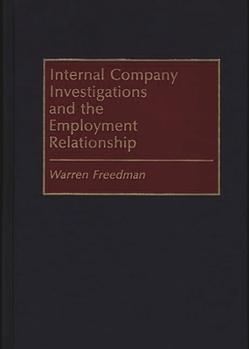Internal Company Investigations and the Employment Relationship
Freedman focuses on investigation of employees by their companies and organizations, delineating the rights and obligations of the employer and the rights and privileges of the employee in the employment relationship. Internal company investigations have in recent years become widespread as companies and corporations seek to ferret out internal problems. Officers and directors as well as employees have been subjected to the internal investigative process. But the content of these internal investigations and the precise procedures utilized by the company or corporation are simply unknown for the obvious reason that no company or corporation wants to publicize the fact of investigation, or wash its dirty linens in public Unless such inside secrets are disclosed in the course of litigation, the author of any text on internal investigations cannot detail the pragmatic substance of the internal investigation. The point is simply that the internal investigation process generally remains confidential until disclosed by the participants.
There are, however, guidelines to the internal investigation that are available, and the author has utilized every known facet of the investigative process to spotlight what the internal investigation is all about. Factors such as the right to privacy; whistleblowing; discrimination based on age, sex, race, national origin, religion, etc.; drug-testing and alcohol-testing; as well as prime causes of discharge or termination of employment are all relevant, and are delineated hereinafter. In most instances, these factors are evidenced by decided cases, thereby establishing precedents and background for the author's conclusions. In view of the increasing amount of litigation in this field, Freedman's treatise will be valuable to bench and bar, and as a guide will be useful to executives in corporations and organizations throughout the private and public sectors.




